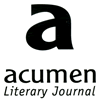John Gurney (1935 – 2000)
To begin this brief obituary, let me say that I, and the editor of Acumen, will miss John Gurney a great deal. Not only because he was a regular presence in the magazine, but also because he was an inspiring man in a very spiritual way. His presence and conversation were interfused, to an almost unique extent in my experience, with a profound knowledge and love of many cultures of divinity – Hindu, Christian, Judaic, Buddhist – as well as of the English literary canon. His learning, too, in the fields of philosophy and psychology was considerable; and his productivity in poetry and verse drama was amazing.
Some years ago I described him in print as arguably the most prolific poet then working in English. I still don’t think I exaggerated. His 16,000 line epic poem War, published by Salzburg University Press, was but one of many projects that found their way into print in the 1990’s. Another was his series of sonnets on the coal industry, published by Stride, and illustrated by the late Paul Piech, an artist as prolific as John and one of the few artists, I am sure, able to match John’s output.
Equally remarkable was his verse play about Joan of Arc, which, in my view, compares favourably with Shaw’s St Joan.
A fluent poet in the sonnet form, John produced a staggering number of them over the years, many of the highest calibre, and Acumen Publications published a selection entitled An Average Revenge in 1992: a series of tributes to past poets which was also a tribute to his own great skill in the genre.
Beyond his involvement with this magazine, John’s work appeared in most of the prestigious journals and weeklies for three decades; and, in addition, he won many prizes including the Bridport, the Cardiff Festival, and was runner-up in both the National and the Arvon Poetry Competitions. His first major publication was Wheal Zion from Peterloo Poets, a book that attested to his long-time fascination with mining and with Cornwall. His ability to move through a range of subject matter in his verse, while conveying a feel always of specialist knowledge, was impressive. At heart, however, he was – like Coleridge – something of a mystic. And that is how I shall remember him: ‘a damaged archangel’ in a secular society – to borrow Lamb’s phrase first used of Coleridge. Gone now to those realms towards which, in life, his mind was more than half-inclined. It was a great sadness to the editor and myself that we were out of the country when his funeral took place and that we did not learn of his death until we came home.
Page(s) 85-86
magazine list
- Features

- zines

- 10th Muse
- 14
- Acumen
- Agenda
- Ambit
- Angel Exhaust
- ARTEMISpoetry

- Atlas
- Blithe Spirit
- Borderlines
- Brando's hat
- Brittle Star

- Candelabrum
- Cannon's Mouth, The
- Chroma
- Coffee House, The
- Dream Catcher
- Equinox
- Erbacce
- Fabric
- Fire
- Floating Bear, The
- French Literary Review, The
- Frogmore Papers, The
- Global Tapestry
- Grosseteste Review
- Homeless Diamonds
- Interpreter's House, The
- Iota
- Journal, The
- Lamport Court
- London Magazine, The
- Magma
- Matchbox
- Matter
- Modern Poetry in Translation
- Monkey Kettle
- Moodswing
- Neon Highway
- New Welsh Review
- North, The
- Oasis
- Obsessed with pipework
- Orbis
- Oxford Poetry
- Painted, spoken

- Paper, The
- Pen Pusher Magazine

- Poetry Cornwall
- Poetry London
- Poetry London (1951)
- Poetry Nation
- Poetry Review, The
- Poetry Salzburg Review
- Poetry Scotland
- Poetry Wales
- Private Tutor
- Purple Patch
- Quarto
- Rain Dog
- Reach Poetry
- Review, The
- Rialto, The
- Second Aeon
- Seventh Quarry, The
- Shearsman
- Smiths Knoll
- Smoke
- South
- Staple
- Strange Faeces
- Tabla Book of New Verse, The
- Thumbscrew
- Tolling Elves
- Ugly Tree, The
- Weyfarers
- Wolf, The

- Yellow Crane, The
